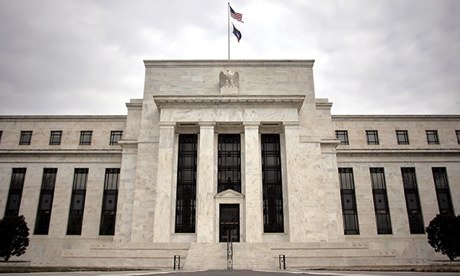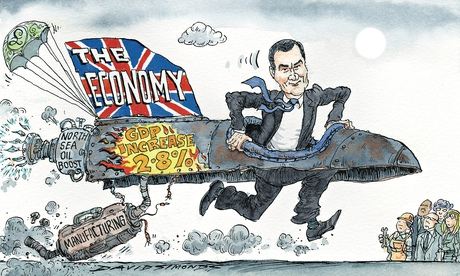Central banks on both sides of the Atlantic are once again being forced to think the unthinkable. More than five years into the global financial crisis, and with a sustained recovery still elusive, the European Central Bank and the Federal Reserve are both contemplating the drastic step of imposing a negative deposit rate on banks' reserves.
The fact that policymakers are even considering forcing banks to lend by effectively charging them for parking money at the central bank is an indication of how desperate the economic backdrop has become.
Their motives for considering a negative deposit rate are different. The Fed believes it would moderate the impact of "tapering", as its $85bn-a-month quantitative easing programme is wound down; while at the ECB, it is seen more as a way of trying to ensure that credit finds its way to businesses.
But in both the US and Europe, there is growing concern about a new buzz-phrase: "secular stagnation".
With growth recovering relatively slowly and inflation low in both the eurozone and the US, one alarming theory, advanced by former White House adviser Larry Summers in a recent speech, is that developed economies today are only able to achieve reasonable levels of growth by inflating monstrous bubbles, like those seen in the runup to the 2008 crisis (and, some at least would argue, the housing bubble now beginning to inflate in the UK).
For whatever reason – overcapacity, demographic challenges, downtrodden workers unable to bargain themselves a pay rise – firms remain reluctant to invest, and households to spend, even with interest rates at close to zero.
But for the key base rate – which governs the price of borrowing across the economy – zero is as low as it goes. If Summers turns out to be right, policymakers may find themselves considering ever more unthinkable options to try and coax their moribund economies back to life over the coming years. Here are a few options:
1 QE WITH KNOBS ON
Quantitative easing has been practised on a large scale in the US and UK, though it remains all but unthinkable in the eurozone, where Germany is firmly opposed. "The ECB would have real problems putting that into effect, because the Germans would walk out," says Russell Jones of Llewellyn Consulting.
Some economists argue that eventually, there will have to be another large-scale dose, with newly generated cash this time being invested instead of being used to buy up government bonds, or, as in the US, mortgage-backed securities.
Ann Pettifor, director of the thinktank Policy Research in Macroeconomics (Prime), says she would like to see central banks directly financing infrastructure schemes or green projects such as insulating homes – perhaps in the process creating bonds to enable the public to take a stake, too, providing an alternative and more productive home for their savings than the boom-bust property market. "It's about fiscal and monetary policy working together," she says.
2 HELICOPTER MONEY
As well as the rather appealing option of dropping bales of cash to be spent by anyone picking them up, this phrase can also refer to central banks printing money to go into government coffers, but with no expectation of getting it back. Otherwise known as "overt monetary finance", is taboo to orthodox economists, because of the perceived risk of hyperinflation. Even appearing to moot it in his final Mansion House speech in 2012 may well have cost Lord Adair Turner the governorship of the Bank of England.
The newly minted money goes to bankroll government deficits, allowing treasuries to chuck austerity out of the window and go for growth.
3 BOOSTING BUSINESS
When the US economist Adam Posen was on the Bank's monetary policy committee, he called for it to "do more", including backing a new institution that he nicknamed "Bennie" (the British Enterprise Investment Entity), to bundle up and sell small business loans so that they could be taken off the books of banks and funnelled to investors, helping to unblock the financial system.
Duncan Weldon, senior policy officer at the TUC, says the current Funding for Lending Scheme, which relies on the banks to pass cheap funding from the Bank of England on to borrowers, has had a "scattergun" effect, with much of the impact being seen in increased unsecured lending to consumers rather than business loans. Posen also called for a taxpayer-backed small business bank, to offer loans to firms turned down by mainstream lenders.
4 DEBT WRITE-OFFS
Carmen Reinhart and Ken Rogoff, the US economists whose findings on the risks of high levels of government debt are hotly contested, have suggested in a new paper that developed countries may eventually have to resort to the measures used by their emerging-market counterparts to escape their own debt crises in recent years. That includes debt restructuring: forcing creditors to accept that they won't get back every penny they've lent. Pettifor says: "That's what bankruptcy law is for. You've got to say: you're not solvent, let's start again".
5 FINANCIAL REPRESSION
This is in a sense a less overt method of debt restructuring – and another approach Reinhart and Rogoff suggested might eventually become necessary in rich economies.
By measures such as keeping interest rates rock bottom, and obliging banks and pension funds to hold large chunks of (low-yielding) government bonds, policymakers make it cheaper for the government to continue borrowing – at the expense of hard-done-by savers. Hardly unthinkable: it's a pattern already recognisable in both the US and the UK.











